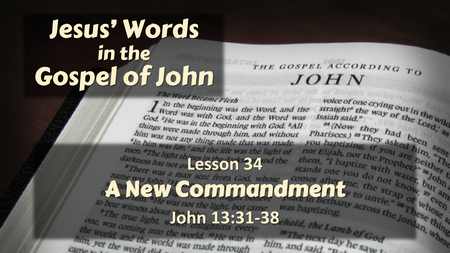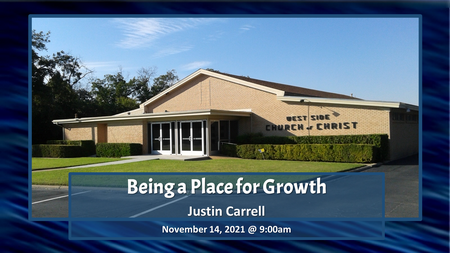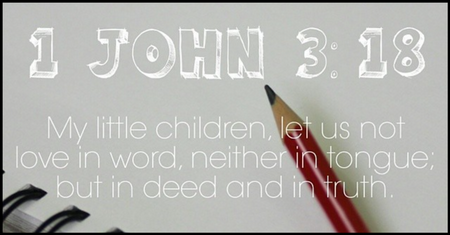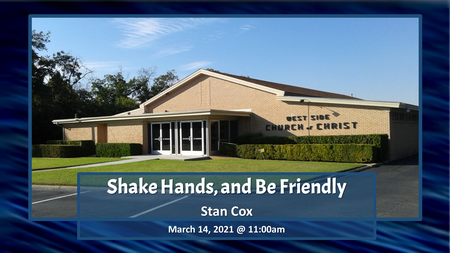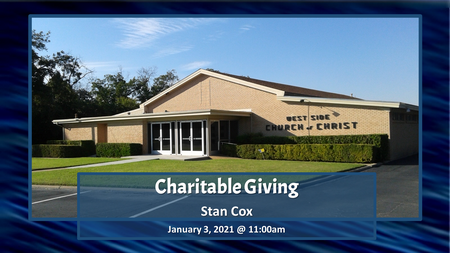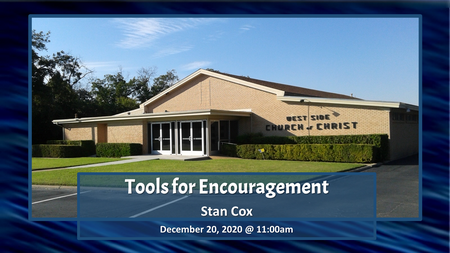Category: Love
Subject: Love
Sermon: A New Commandment
Jesus gave a new commandment to His disciples in John 13:31-38. This lesson discusses that commandment, and His conversation with Peter.
Sermon: Being a Place for Growth
Speaker: Justin Carrell.
It is important for our congregation that we be a safe and welcoming place, that each of us are able to confess our failings, and grow spiritual as we love one another.
Practical Christian Attributes
The apostle Peter promised that the adding of various attributes to our faith will preclude us being “barren [or] unfruitful in the knowledge of our Lord Jesus Christ.” In fact, “you will never stumble; for so an entrance will be supplied to you abundantly into the everlasting kingdom of our Lord and Savior Jesus Christ” (2 Peter 1:8,10-11).
We might ask why are these attributes key? It is because they equip us to act and to be the type of people who please God. They direct us in the paths of righteousness! This is especially true in our interactions with others. Remember, the two great commandments are to love God and love your neighbor (cf. Matthew 22:37-40). If we keep the necessity of love for God and man at the forefront of our thinking, it is easy to see why Peter would call for these qualities to be present in our lives.
An Elder’s Demeanor
In 1 Timothy 3, the list of qualifications is given for an elder. Regarding his character, attributes such as: blameless, temperate, sober-minded, of good behavior, not given to wine, not greedy for money, gentle, not quarrelsome, not covetous and humble are all listed. The list is similar in Titus 1. What they describe is an older man who is a mature Christian. One who has developed and practices the type of love and discernment that God requires of all who belong to Him.
There are other lists that are given in the New Testament which describe this kind of Christian. In Galatians 5, the apostle Paul gives us a list he defines as the fruit of the Spirit. The attributes are: love, joy, peace, longsuffering, kindness, goodness, faithfulness, gentleness and self-control.
Love in Deed and Truth
A common theme of the apostle John in his letters is the need to love your brothers and sisters in Christ. He states in 1 John 3:10, “In this the children of God and the children of the devil are manifest: Whoever does not practice righteousness is not of God, nor is he who does not love his brother.” Love is the characteristic that distinguishes God’s people from the rest of society. “We know that we have passed from death to live, because we love the brethren. He who does not love his brother abides in death” (3:14).
The concept of love can be nebulous. When someone says, “I love you,” what do they mean? What kind of love is it? Is it philanthropy? (A love of mankind in general)? It is fondness? Is it romantic attachment? Consider the young lady seeking to kindly dissuade the young man who seeks to woo her, “I love you, just not in that way.”
In the call to love your brother, the great apostle clearly establishes what is intended by the words. He writes in 1 John 3:18, “My little children, let us not love in word or in tongue, but in deed and in truth.” This does not mean that it is wrong to proclaim our love for our brother, rather that we are to show that love through action! Anything less is below the standard established by the Holy Spirit.
So, the next time you want to profess your love for your brother in Christ, express it through actions that accord with God’s call to righteousness. It is easy to talk the talk, but God expects us to walk the walk!
Click below to…
Sermon: Shake Hands and Be Friendly, Brethren!
Because of the circumstances of the day, it is a challenge for us to maintain our familial affection and closeness as a congregation. However, it is important to our spiritual welfare, and it is required of us by God.
Strengthen Those Feeble Knees!
“Therefore strengthen the hands which hang down, and the feeble knees, 13 and make straight paths for your feet, so that what is lame may not be dislocated, but rather be healed” (Hebrews 12:12-13).
The text mirrors Isaiah 35:3 and Proverbs 4:26. The idea is one of discouragement and weakness through exhaustion. The proper response to persecution and distress is to exult in the growth it brings — “the peaceable fruit of righteousness” (vs. 11). But, as the writer states, “no chastening seems to be joyful for the present, but painful…” (vs. 11).
We see another in a weakened state, and our love demands a response. It is possible for me to give my brother in Christ encouragement. I can help him to rest, and regroup, thereby strengthening him. I can, and must help! “Therefore, to him who knows to do good and does not do it, to him it is sin” (James 4:17).
Those who are handicapped (lame) have many challenges. We reserve parking spaces for them near entrances. We build gentle ramps with rails to assist them from one level to another. We supply crutches, splints, braces, walkers and wheel chairs to enable them opportunity where otherwise they would be shut out.
It is so important to supply the spiritually exhausted the same benefits. We have a responsibility to help them, to make their paths as unencumbered as possible to that they will not falter. We need to love. We need to help.
Click below to…
Sermon: Ugliness
Just like in Roman times, our society is full of ugliness and sin. Violence, oppression, immorality, vitriol and corruption is everywhere. What is the proper Christian response?
It Pleased the Father
“For it pleased the Father that in Him all the fullness should dwell, and by Him to reconcile all things to Himself, by Him, whether things on earth or things in heaven, having made peace through the blood of His cross” (Colossians 1:19-20).
“It pleased the Father.” This is Paul’s assessment of God’s plan for redeeming man. This meaning of this passage is disputed, because “the Father that” is not in the Greek. Rather it is supplied by the translators. A good argument is made by Walton Weaver in his commentary regarding the meaning. He states it as follows: God was pleased to, in all His fullness, dwell in His Son. This principle is set forth clearly in 2:9, “For in Him [Christ] dwells all the fullness of the Godhead bodily.”
Likewise it pleased God to reconcile man to Himself through the sacrifice of Christ on the cross. This is the central message of the Bible. Jesus said, “I am the way, the truth, and the life. No one comes to the Father except through Me” (John 14:6).
God was pleased. Despite the ultimate nature of that sacrifice in offering His only begotten Son, it pleased Him to do so. Why? Why was He so willing to do such a thing? Why did it please Him? Because He loves us! “For God so loved the world that He gave His only begotten Son, that whoever believes in Him should not perish but have everlasting life” (John 3:16).
There are lessons here for us. First, to rejoice in His love. Second, to recognize the greatness of the debt we owe due to His marvelous grace (cf. Romans 1:14-15). Finally, this: “Beloved, if God so loved us, we also ought to love one another” (1 John 4:11).
Click below to…
Sermon: Charitable Giving
A discussion of the importance of individual benevolence as an expression of the love we have for men and God.
Sermon: Tools for Encouragement
It is important for us to be active in encouraging our brethren and others. God supplies us tools to enable us, such as His powerful word, the imperative of love, and patience.
Sermon: Proper Love
The proper love that characterizes the true child of God is that which defines the character of God Himself. It is commanded of us. Yet, many have as the object of their love things that are inappropriate. We should love God, not the world.
Paul’s Love and Concern
“Therefore, my beloved and longed-for brethren, my joy and crown, so stand fast in the Lord, beloved” (Philippians 4:1).
The apostle Paul had a wonderful relationship with the church in Philippi. A faithful group, the brethren there had great affection for the apostle, and they showed that love through diligent care.
They sent Epaphroditus to Rome with a gift for Paul. Because of their support, his incarceration was easier to bear. Paul acknowledged their support in his letter, showing his appreciation for their generosity.
“But I rejoiced in the Lord greatly that now at last your care for me has flourished again; though you surely did care, but you lacked opportunity” (4:10).
“Nevertheless you have done well that you shared in my distress. Now you Philippians know also that in the beginning of the gospel, when I departed from Macedonia, no church shared with me concerning giving and receiving but you only. For even in Thessalonica you sent aid once and again for my necessities” (4:14-16).
Because of their love for him, Paul loved them in return. He was invested in their spiritual welfare. His primary concern, as seen in (4:1), was for them to “stand fast in the Lord.”
Who do you love? Who is most important in your life? Have you told them that you are concerned for their soul? Have you let them know how important it is for them to “stand fast in the Lord.” Have you shown them how to do that? If not, why not?
Click below to…
Sermon: One Another
An examination of both the Lord’s words, and Paul’s writings, showing how Christians are to treat one another.
Sermon: Looking at Parallels
The Holy Spirit uses comparisons, like comparing the lifetime committment of marriage to the Jews relationship with the law (Romans 7), and Jesus relationhip to the church to establish truths in the husband/wife relationship. The Hebrew writer does the same in Hebrews 9, teaching an important lesson about Christ’s sacrifice.




